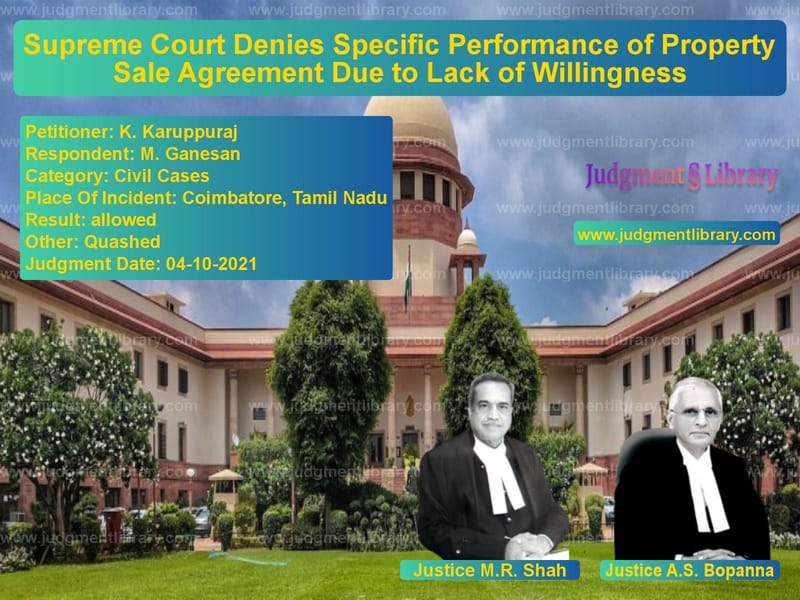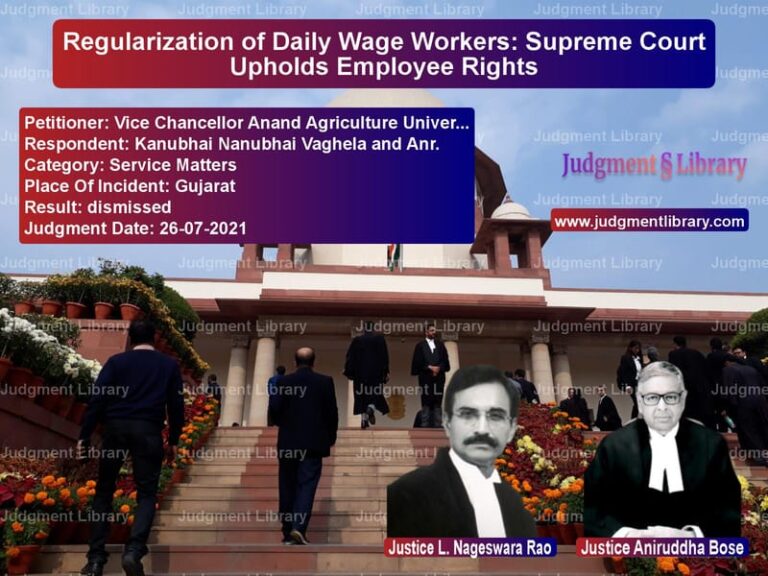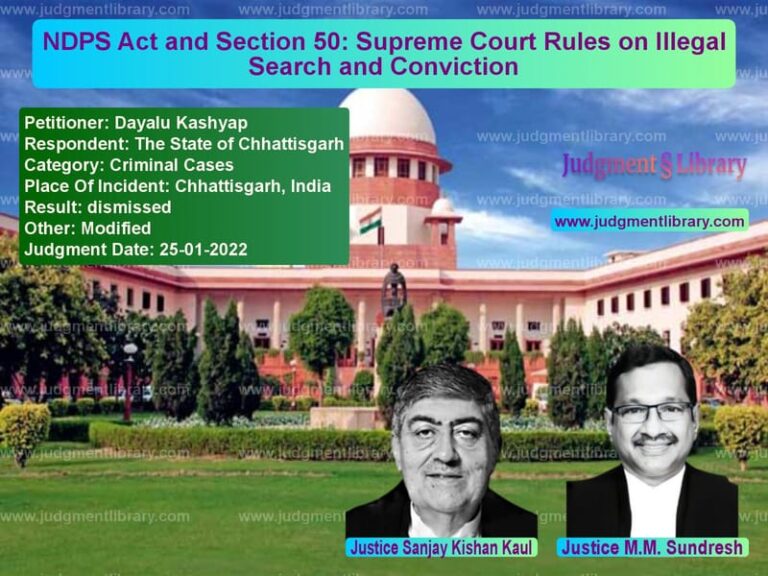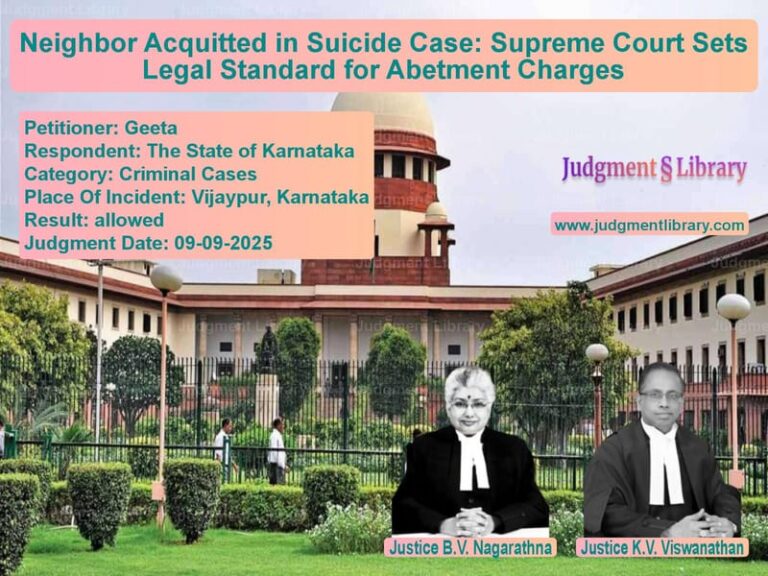Supreme Court Denies Specific Performance of Property Sale Agreement Due to Lack of Willingness
The Supreme Court of India recently ruled in the case of K. Karuppuraj vs. M. Ganesan, where it overturned the Madras High Court’s judgment granting specific performance of a property sale agreement. The Court held that the plaintiff failed to demonstrate willingness to perform the contract as per its original terms, making the specific performance decree legally unsustainable.
Background of the Case
The dispute arose from a property sale agreement entered into between the appellant (defendant) and the respondent (plaintiff) regarding land situated in Kaspa, Coimbatore. The agreement stipulated that the defendant would sell the land for ₹16.20 lakh, with an advance payment of ₹3,60,001 made at the time of execution.
A key condition in the agreement required the defendant to evict tenants from the property before executing the sale deed. However, the plaintiff alleged that the defendant failed to remove the tenants, prompting him to file a suit for specific performance.
Petitioner’s Arguments (K. Karuppuraj)
The appellant-defendant argued that:
- The plaintiff had not demonstrated a consistent willingness to execute the sale agreement as originally agreed.
- The High Court erred in relying on an affidavit filed at the appellate stage where, for the first time, the plaintiff stated he was ready to purchase the property even with tenants.
- The Trial Court had correctly ruled that the plaintiff was unwilling to complete the transaction unless the tenants were removed.
- The High Court violated procedural requirements by failing to frame points for determination under Order XLI Rule 31 of the Civil Procedure Code (CPC).
Respondent’s Arguments (M. Ganesan)
The respondent-plaintiff countered by arguing that:
- He had always been ready and willing to complete the transaction, but the defendant failed to evict the tenants.
- The affidavit submitted before the High Court clarified that he was prepared to purchase the property even with tenants.
- The Trial Court’s ruling should be set aside because it unfairly penalized him for the defendant’s failure to remove tenants.
Supreme Court’s Analysis
1. Can an Appellate Court Accept New Claims Not Raised in the Trial Court?
The Supreme Court noted that the plaintiff’s affidavit, stating his willingness to purchase the property with tenants, was introduced for the first time at the appellate stage. The Court ruled that such an affidavit could not be relied upon without amending the original pleadings.
The judgment stated:
“What was not pleaded by the plaintiff in the plaint on willingness to purchase the property with tenants has now been permitted by the High Court relying upon the affidavit filed before it for the first time. Such a course adopted by the High Court is wholly impermissible under the law.”
2. Was the Plaintiff Ready and Willing to Perform His Obligations?
The Court found that while the plaintiff had financial readiness, he was not willing to perform his obligations as per the original contract.
“For the purpose of passing a decree for specific performance, both readiness and willingness have to be established. The plaintiff was not willing to purchase the property with tenants, as evident from his pleadings and conduct.”
3. Did the High Court Follow Procedural Requirements?
The Supreme Court criticized the High Court for failing to frame points for determination as required under Order XLI Rule 31 CPC. The Court held that the appellate court must:
- Reappreciate the entire evidence on record.
- Provide specific findings on all contested issues.
- Follow established procedural requirements when reversing a Trial Court judgment.
The judgment observed:
“The High Court has neither re-appreciated the entire evidence on record nor given any specific findings on the issues raised before the Trial Court. The judgment is legally unsustainable.”
Judgment and Conclusion
The Supreme Court set aside the High Court’s order and restored the Trial Court’s judgment, which had dismissed the suit for specific performance. However, the Court directed the defendant to refund the advance payment of ₹3,60,001 along with 18% annual interest until full realization.
The ruling reinforces that:
- Specific performance requires both readiness and willingness from the plaintiff.
- New claims cannot be introduced at the appellate stage without amending pleadings.
- High Courts must follow proper appellate procedures, including framing issues and reappreciating evidence.
Judges: The judgment was delivered by M.R. Shah and A.S. Bopanna.
Petition Result: Allowed
Petitioner Name: K. Karuppuraj.Respondent Name: M. Ganesan.Judgment By: Justice M.R. Shah, Justice A.S. Bopanna.Place Of Incident: Coimbatore, Tamil Nadu.Judgment Date: 04-10-2021.
Don’t miss out on the full details! Download the complete judgment in PDF format below and gain valuable insights instantly!
Download Judgment: k.-karuppuraj-vs-m.-ganesan-supreme-court-of-india-judgment-dated-04-10-2021.pdf
Directly Download Judgment: Directly download this Judgment
See all petitions in Specific Performance
See all petitions in Property Disputes
See all petitions in Contract Disputes
See all petitions in Judgment by Mukeshkumar Rasikbhai Shah
See all petitions in Judgment by A. S. Bopanna
See all petitions in allowed
See all petitions in Quashed
See all petitions in supreme court of India judgments October 2021
See all petitions in 2021 judgments
See all posts in Civil Cases Category
See all allowed petitions in Civil Cases Category
See all Dismissed petitions in Civil Cases Category
See all partially allowed petitions in Civil Cases Category







